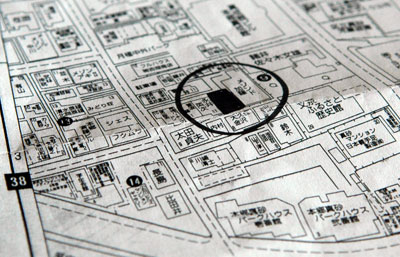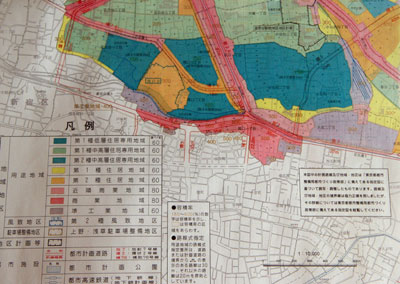
Perhaps the site of a new abode
A little more than a week ago, we saw an interesting piece of land not too far from where we live - just on the other side of the station, in fact. It’s nestled into the corner of an alley in a charmingly run-down historic neighborhood. The lot is about 100 square meters in size, with an 80-year-old house atop it. It may soon be ours, because now we are in the throes of getting a mortgage and a home loan.
When you are buying property in Tokyo, there are a million things to know. Here are a few I’ve learned along the way:
- Roads legally must be 4 meters wide, but many of Tokyo’s streets are narrower. If you buy land on a street narrower than 4 meters, you effectively donate the difference to make up your half of the 2 meters. This is called setback.
- You may only build on a certain percentage of your land. Generally this is 80% or 60% and the amount is determined by the zoning category. This rule is called kenpei ritsu.
- Another building restriction is the maximum square footage your building can be. This is determined by the width of your road and the zoning. On a wide street in a commercial district, you might be able to build 600% of the land’s area. In a residential area, it’s likely to be 150% - 300% depending on the road but basement rooms are excluded from the square footage total. This rule is called youseki ritsu.
- Zoning rules also include a maximum height for your building - narrow lots and residential areas have lower maximums. If your building is taller than ten meters, you must follow additional guidelines about sunlight and shadows falling on neighboring buildings.
- Some neighborhoods, where wooden building are tightly packed, require special construction precautions for fire (called bouka chiiki). According to the current laws, all buildings must be built 50 cm away from the edges of the lot. Eventually, if everyone follows this rule (and I’ve seen many cases where they did not), there will be at least a 1 meter gap between all buildings in the city.
- Not all property has ownership rights - some plots in Tokyo are still on an old leasing system. These places are dwindling, but there are still a few on the market. They always look like a good bargain…

Bunkyo-ku zoning map
Gaijin-friendly Lenders
After you wade through the rules and find a property that suits your needs then, unless you are very rich or have been saving for decades, you have to get a loan.
Obtaining a mortgage in Japan is not the easiest prospect if you are a foreigner with neither permanent residency nor a Japanese spouse. If you don’t meet those conditions, many banks won’t even say hello. Rightly so, as there is a risk that your future visa renewals will go sour and you won’t be in Japan to repay your debt. Fortunately for those of us with a desire to settle down in Japan, it’s not a completely impossible prospect. There are a few institutions that will loan to non-PR foreigners.
I don’t want to jinx our chances (and this purchase is hardly a done deal - we are still negotiating with the property owner) but I do want to share what I’ve learned about the process so far, just in case you were thinking of buying property in Tokyo. Or if I ever need to go through this again…
For a land purchase where you plan to build your own home (as in our case) you need to take out two separate loans. I don’t think it’s done that way in the US, but this is normal in Japan as it saves you the cost of repaying the construction loan until the building phase gets underway. But it means two loan applications and I assume two sets of loan fees, stamp tariffs and other closing costs, which are considerable.
- Shinsei Bank.
- Shinsei is known to be foreigner-friendly and they have English-speaking customer service so that puts them in my good graces. Loans to non-PR foreigners are possible, but there is scads of paperwork. After you turn in your last two years’ income and tax statements, the contract for land purchase, foreign registration cards, and the application forms, the bank perform an appraisal on the land before granting the mortgage. They will knock down the loan amount or refuse outright if they find fault with the property.
- They also do a “pre-appraisal” on the planned house before the land loan is granted. This is unusual, according to our architect, who is scrambling to get us preliminary plans and a budget for the bank. For non-PR foreigners, Shinsei require a second mortgage on the property until you become a permanent resident, and you must beg a favor from a Japanese friend to accept mail for you in the event you leave Japan (and the friend has to attend the closing to make it an official favor).
- Mitsubishi UFJ.
- Acting on a clue from Danny Choo’s account of purchasing property in Tokyo, I filled in a form on the UFJ website and received a huge application packet in the mail. The forms and instructions are entirely in Japanese - fine-print legal Japanese. Ouch. I will see how things go with Shinsei before I delve in there too deeply. I think there will be lots more paperwork than just this inch-thick application.
- Suruga Bank.
- They lend to anyone through their “Gaikokujin Home Loan” program. It’s very nearly “no questions asked” though they require the transaction to be conducted in Japanese. However, for Suruga’s minimal paperwork you pay maximal interest. Their current rate is about 4.5%, or 2 percent more than typical Japanese banks.
- New City Mortgage.
- I have not thoroughly investigated this option, but they do loan to foreigners without PR status. Interest rates are not he most favorable from what I’ve been told.
Let’s hope all this explanation hasn’t ruined our application karma, that the owner will accept our offer, that the bank will approve our loan, and that all of this will be quickly concluded so that we can move on to the fun part - designing the house.
Posted by kuri at March 26, 2007 01:49 PMI wish you the best of luck. These types of transactions are extremely complex and beset with dangers :) even when they’re being conducted in your native language in your home country. But should every sheaf of paper get the proper signature, it’s a wonderful feeling to have your own place. We’ll keep our fingers crossed for you. I’m very curious to see what design you decide upon for the house.
Posted by: Seth on March 26, 2007 09:39 PMI hope it won’t hurt to wish you good luck! Why is the land you want the only all black square on the map? Seems ominous.
Posted by: karrie on March 27, 2007 12:04 AMWell, I guess I did jinx it. The owner won’t budge on the land price, and construction estimates we received today are about 2500万円 higher than our budget. At least my notes above will be helpful during the next round.
Posted by: Kristen on March 27, 2007 06:48 AMHave you considered getting permament residency? Of all the various visas I’ve had during my time in Japan it proved in many ways the easiest to obtain. True, you do have to run around obtaining reams of documents from various government offices, and yes, they will contact employers, friends, and family members to find out about you, but assuming you don’t have any dark secrets, that should not be a huge problem.
Thinking that I had all the documents (they’ll give you a list of what you need at Imigration) I went down to apply and, having waited in the usual long line, got to the front where they informed me that I was short one piece of paper. When obtaining other visas in the past that would have meant: game over, back to square one. For the Permanent Resident visa it was different. The Immigration offical apologized for the trouble, gave me a stamped, addressed envelope, and told me to send in the missing document whenever I had a chance.
A few months later I was, officially, a permanent resident, and that made it a lot easier to get loans when I bought land in Kanagawa.
And permanent residencies are *not*, as many misinformed folks will tell you, limited to people with Japanese spouses (though it certainly helps to have one).
Good luck (and I wish I’d had the information you posted when I was going through the process!)
Posted by: David on March 27, 2007 08:29 AMThis is so exciting!!! Ive been wondering what you have been up to… Ive got my fingers crossed for you!
Posted by: j-ster on March 28, 2007 10:03 AMBad luck on that - hope things go better for you on the next go around.
Incidentally, this brings up a question, since I’ve recently started considering buying a house in Himeji. What’s the standard term for a housing loan in Japan? 15 years? 20? I would imagine there are several options, and there’s nothing even remotely solid; I’m just looking to get some general info, which this posting had lots of (Thanks, by the way!)
Posted by: Mike on April 1, 2007 10:19 AMAnother place you might find property is the government’s public auction listings:
http://www.koubai.nta.go.jp/auctionx/public/hp0241.php
There’s not a lot available close to central Tokyo but there is a block of land near Ochiai-Minami-Nagasaki station (落合南長崎駅) on the Oedo line (大江戸線) that you might be interested in.
Good luck!
